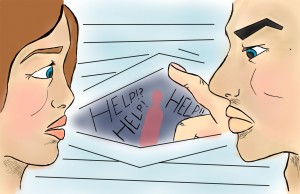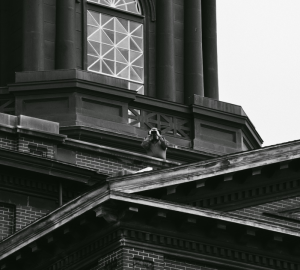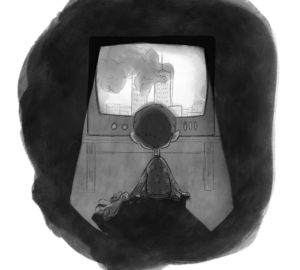Another October Saturday night at the Igbo household found the hubby and I up just past midnight watching “Death Wish 4.” The doorbell rang. Hubby and I exchanged question marks before he went downstairs to answer. At the door stood a high-haired young man, shoeless, wild-eyed, emanating fear and desperation. Hubby kept the door closed.

“What’s up, Man? How can I help you?” Hubby peeked through the door shade as I stood on the first landing of our staircase.
“Can I come in and call the police, I’ve been jumped and robbed,” the young man panted. The stranger went on to explain that his name was Felix and he’d been at a party in an adjacent subdivision when a few of the other attendees decided to beat him and steal his phone, wallet and shoes. Opting for flight over fight, Felix ran as far away from the house party and harm’s way as he could and looked frantically for the first home with any signs of life. The first home, with lights on in just about every window, happened to be ours.
Hubby and I felt conflicted. Felix didn’t appear to be lying. We’d both been in similar predicaments when we were younger, alone at night and in need of help. We wanted to offer some sort of aid. But then again, we’re not stupid. Atlanta’s nightly news reports always seem to feature some horrible tale of a family being accosted in their home by bands of armed marauders. How did we know that this dude wasn’t shining us on, calling our attention to the front of the house, while his AK-47-toting partners were at our back door revving to rape, plunder and pillage?
We didn’t let Felix inside. Instead, we called the police for him while he stood on the doorstep. While waiting, Felix asked for some water. We grabbed a bottle but refused to open the door. About fifteen minutes later, the police came. As Felix approached the police and started recounting his sad tale, Hubby delivered the bottled water and bid Felix good luck and good night. We felt that we had done our neighborly duty in helping the guy, but we made a mental note to turn our lights out after a certain hour.
When I spoke to fellow students about this incident, I got the same feedback from all. No, Hubby and I shouldn’t have let the guy inside. Yes, we were right to put our own safety first. I appreciated the validation but I still felt sad. If this had been 50 years ago, we might not have thought twice about letting Felix in to call the police. I might have given him first aid, and fed him dinner and freshly baked apple pie. Hubby might have given him an extra pair of shoes and a ride home.
Today is a completely different story. We’re afraid of our neighbors because most of them are strangers, and we have no interest in discovering more about them beyond whether or not they’ll keep their dogs from pooping on our front lawn. We hide in our homes hoping that the world outside will leave us alone. We don’t want to get involved in seemingly sticky situations because we don’t want to become victims. We are so opposed to becoming victims that we are lax to do anything beneficial for people who truly need our help.
According to an Atlanta crime rates report on Neighborhoodscout.com, about one in 13, or 75 in 1000 people will be a victim of a burglary, larceny over fifty dollars, motor vehicle theft or arson. That equals 7 percent, not 75 or 50 or 25 percent. While these statistics might be a tad hairier than other metropolitan areas in the country, they still aren’t horrible. The majority of Atlanta residents will not fall victim to some heinous crime. Nightly news would have us to believe that we’re living in the kind of community that warrants the same the type of vigilante justice Charles Bronson doled out in “Death Wish 4.” That isn’t the case.
Crime sucks. Violent crimes suck even more. But living in a state of fear is worst of all. For the most part, we’re all just a bunch of humans trying to make the best out of our individual situations. We all need a little help sometimes, and we all usually feel good after we help someone else. And because we’re generally all in the same boat, we should fear neither each other nor our inner Samaritans.






















